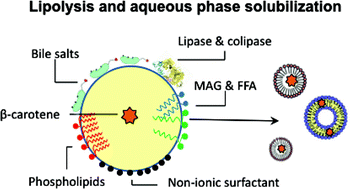Scientists from Canada have investigated b-carotene release from lipid nanodispersions under simulated gastrointestinal conditions. Enhancing the health benefits of food by incorporating bioactive molecules (such as b-carotene) is of increasing interest as it may help with chronic conditions. The bioactives can be incorporated into the food matrices by designing oil-in-water emulsions.
 In this work, the influence of interfacial structure of solid lipid nanoparticle dispersions and oil-in-water emulsions containing encapsulated b-carotene were examined under simulated gastrointestinal conditions. It was found that the uptake of lipolytic products and lipophilic bioactives depended on nonionic surfactant type, the extent of lipid digestion, as well as the presence of bile salts and phospholipids.
In this work, the influence of interfacial structure of solid lipid nanoparticle dispersions and oil-in-water emulsions containing encapsulated b-carotene were examined under simulated gastrointestinal conditions. It was found that the uptake of lipolytic products and lipophilic bioactives depended on nonionic surfactant type, the extent of lipid digestion, as well as the presence of bile salts and phospholipids.
This work was presented at the Delivery of Functionality in Complex Food Systems Symposium held in Guelph in August 2011, and is part of our themed issue on the Delivery of Functionality coming soon in 2012. The article is free to access until the end of 2011, to read it in full click the link below:
Digestibility and b-carotene release from lipid nanodispersions depend on dispersed phase crystallinity and interfacial properties, Amir Malaki Nik, Sarah Langmaid and Amanda J. Wright, Food Funct., 2012, DOI: 10.1039/c1fo10201j










